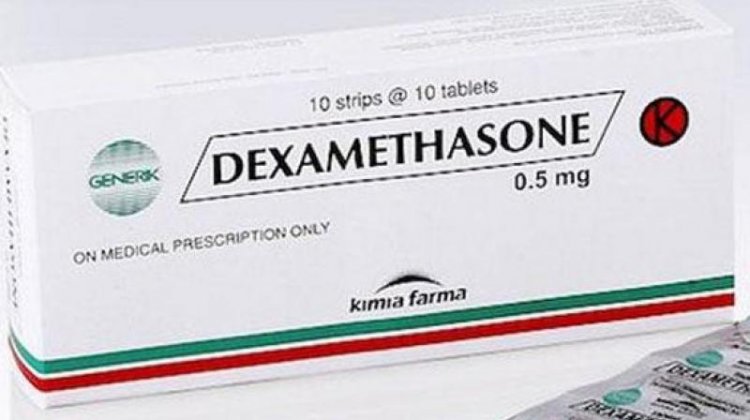Dexamethasone - The First Life-Saving COVID-19 Drug

A major breakthrough in the fight against the coronavirus has taken place in the name of Dexamethasone.
This low-cost drug is appearing to offer some medical respite from the Covid-19 pandemic. Researchers in England say they have the first evidence that the widely available steroid called dexamethasone reduced deaths by up to one third in severely ill ventilated patients.
It is readily available in hospitals and should now become “standard of care” in Covid-19 patients on ventilators or oxygen, researchers say.
A study found the steroid cut the risk of death by a third for patients on ventilators, and by a fifth for those on oxygen – described by researchers as “statistically significant”.
The observation was based on a clinical trial called ‘RECOVERY’ to test potential treatments for COVID-19, including this steroid treatment with low-dose.
The UK government has 200,000 courses of the drug in its stockpile and says the NHS will make dexamethasone available to patients.
Prime Minister Boris Johnson said there was a genuine case to celebrate "a remarkable British scientific achievement", adding: "We have taken steps to ensure we have enough supplies, even in the event of a second peak."
About 19 out of 20 patients with coronavirus recover without being admitted to the hospital. Of those who are admitted, most also recover but some may need oxygen or mechanical ventilation and these are the high-risk patients' dexamethasone that appears to help.
The drug is already used to reduce inflammation in a range of other conditions, including arthritis, asthma, and some skin conditions.
And it appears to help stop some of the damage that can happen when the body's immune system goes into overdrive as it tries to fight off coronavirus.
What is this drug?
Dexamethasone is a type of corticosteroid medication. It is used in the treatment of many conditions, including rheumatic problems, a number of skin diseases, severe allergies, asthma, chronic obstructive lung disease, croup, brain swelling, and eye pain and then it is followed by an eye surgery and along with antibiotics in tuberculosis. In adrenocortical insufficiency, it should be used together with a medication that has greater mineralocorticoid effects such as fludrocortisone. In preterm labour, it may be used to improve outcomes in the baby. It may be taken by mouth, as an injection into a muscle, or intravenously. The effects of dexamethasone are frequently seen within a day and last for about three days.
In Australia, oral use is category A, which means - it has been frequently used in pregnancy and not been found to cause problems to the baby. It should not be taken when breastfeeding. Dexamethasone has anti-inflammatory and immunosuppressant effects.
Dexamethasone was first made in 1957 and was approved for medical use in 1961. It is on the WHO’s list of essential medicines. Dexamethasone is not expensive. In the United States, a month of medication typically costs less than US$25.
In India, a course of treatment for preterm labour costs about US$0.5. It is available in most areas of the world. In 2016, it was the 259th most prescribed medication in the United States, with more than a million prescriptions.
This is the first evidence that a drug can improve the survival rate. Earlier, several other measures such as convalescent plasma therapy were tried to save lives but none have been found to be as effective.
The chief investigators of the randomised evaluation of COVID -19 therapy (recovery) trial said low-cost Dexamethasone reduces death by up to one-third in hospitalised patients with severe respiratory complications. Dexamethasone reduces inflammation and lowers the body's immune response and is used with other drugs to treat different types of cancer:
Researchers estimate that if they had known what they now know about dexamethasone at the start of the pandemic, 4,000 to 5,000 lives could have been saved.
They added that based on their results, one death would be prevented by treatment of around eight patients on ventilators, or around one in every 25 patients requiring oxygen alone.
According to official figures, 395 mechanical ventilator beds were occupied by patients in the UK as of 12th June.
Peter Horby, professor of emerging infectious diseases in the Nuffield Department of Medicine, University of Oxford, and one of the chief investigators for the trial, described it as “an extremely welcome result”.
“This is the only drug that has so far shown to reduce mortality, and it reduces it significantly. It is a major breakthrough, I think,” he said.
“Dexamethasone is inexpensive, on the shelf, and can be used immediately to save lives worldwide.”
Martin Landray, professor of medicine and epidemiology at the Nuffield Department of Population Health, University of Oxford, was also one of the chief investigators.
He said: “Covid-19 is a global disease – it is fantastic that the first treatment demonstrated to reduce mortality is one that is instantly available and affordable worldwide.”
Prof Landray added: “It’s been around for probably 60 years.
“It costs in the order of £5, £5 for a complete course of treatment in the NHS, and substantially less – probably less than one dollar – in other parts of the world, for example in India.”
Prof Horby said: “The survival benefit is clear and large in those patients who are sick enough to require oxygen treatment, so dexamethasone should now become standard of care in these patients.”
The RECOVERY Trial
This trial which stands for ‘Randomised Evaluation of COVID-19 therapy’ was coordinated by scientists from the University of Oxford.
The mortality rate of those who end up on a ventilator is above 40%, but this figure was reduced by a third among those prescribed dexamethasone.
Chief Medical Officer for England Prof Chris Whitty said it would save lives around the world.
More than 11,500 patients from 175 NHS (Nasa & Hub Super-speciality Hospital) hospitals have been enrolled on to the Recovery trial since it was set up in March to test a range of potential coronavirus treatments.
In the dexamethasone study, 2,104 patients received 6mg of dexamethasone once a day via either mouth or intravenous injection for 10 days. Their outcomes were compared with a control group of 4,321 patients.
Over a 28-day period, the mortality rate among those requiring ventilation was 41% and 25% among those needing oxygen. The mortality rate among those not requiring respiratory intervention was 13%.
However, the study did not see any benefit in those patients who were in the hospital with Covid-19, but whose lungs were working sufficiently well.
Prof Landray said: “What we can see is the biggest benefits in those people at the biggest risks, which I guess if you wanted to design a drug is exactly how you’d hope to have the results.”
*NOTE: people should not go out and buy it to take at home.
Dexamethasone does not appear to help people with milder symptoms of coronavirus who do not need help with their breathing.
Professor Stephen Powis, NHS England medical director, said: “This is a huge breakthrough in our search for new ways to successfully treat patients with COVID, both in the UK and across the world.
“It is thanks to NHS staff and patients who participated in the trial that from now, we are able to use this drug to dramatically improve Covid-19 survival for people in hospitals who require oxygen or ventilation.”
So far, the only other drug proven to benefit COVID patients is Remdesivir, which has been used for Ebola. That has been shown to reduce the duration of coronavirus symptoms from 15 days to 11.
But, the evidence was not strong enough to show whether it reduced mortality.
Unlike Dexamethasone, ‘Remdesivir’ is a new drug with limited supplies and a price has yet to be announced.















































